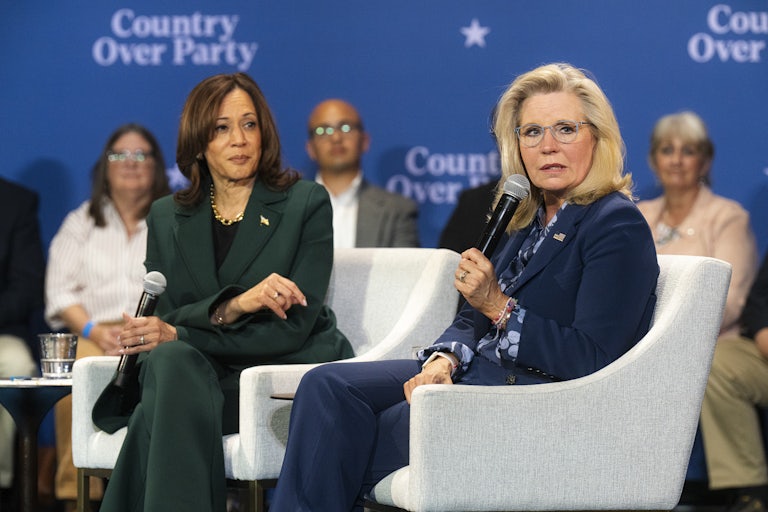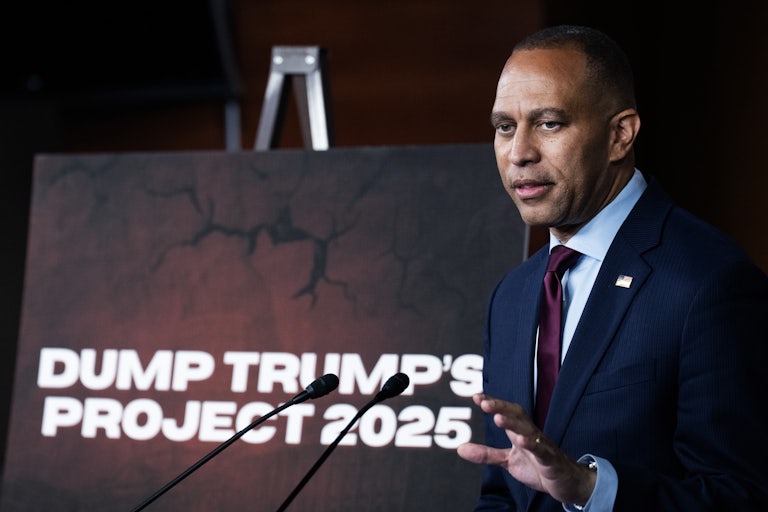Shove the Presidency Down Trump’s Throat
Liberals spent the president-elect’s first term trying and failing to kick him out of office. This time out, they need to turn the White House into a prison.

The most recent entry in the “good advice for Democrats” canon comes from occasional TNR contributor and Bulwark writer Jonathan V. Last, who wrote, “The job of the Democratic party comes in two parts. First: Do not help Republicans. Not in any way. Second: Make Donald Trump own every bad outcome that happens, anywhere in the world.” True enough. The only problem here is the lack of an organized Democratic Party to actually serve as an aggressive opposition party. We could use one of those!
Nevertheless, there is a lesson here for liberals that we should perhaps heed while Democrats in Washington debate how supine they want to get for the incoming administration. During Trump’s first term, much of the mainstream left organized itself around the idea that “this was not normal” and that surely our over-regarded system of norms would save us from Trump. And so deep investments were made in various quick fixes—an impeachment effort and the Mueller investigation chief among them—that seemed to offer the hope of prematurely canceling the Trump presidency, without much regard for how difficult it is to actually oust a president (or for the decades of evidence suggesting that our justice system routinely fails to hold the rich and powerful to account, more broadly).
A second Trump era offers the opportunity for a change of course—a second reckoning of sorts. I think that Last is on to something when he suggests that Trump’s opposition should force him to “own every bad outcome that happens, anywhere in the world.” I’d actually take this a step further. Rather than exert so much energy trying to thrust Trump out of the presidency, liberals would be well served to spend their time thrusting the presidency upon Donald Trump. Instead of searching for illusory quick fixes for the existence of the Trump administration, start demanding the Trump administration fix everything quickly.
If there’s one thing we’ve learned from the sample size of one Trump presidency and his four years out of power, it’s that Trump is a bog-standard rich white guy whom the justice system is largely incapable of bringing to heel. He has powerful friends (oligarchs, Supreme Court justices), deep pockets, and a well-tempered ability to joust in the media. By now we’ve watched ol’ Donny “wriggle out of this one” on multiple occasions; he seems to thrive if you put him at the center of something he can deem to be a witch hunt—even when those hunters bag their quarry, as prosecutors did in his hush-money case.
But Trump has historically faltered when he’s been forced to contend with the actual pressure of the presidency and its myriad responsibilities (see also: the Covid-19 pandemic) because his ideas are bad and he doesn’t have a deep and abiding interest in public service to really make a sustained effort to confront, let alone solve, the biggest problems we face.
President Barack Obama found the presidency to be an exhaustingly taxing job, so much so that he famously went to somewhat mind-blowing lengths to limit the nonpresidential decisions he had to make in order to stay keen enough to handle the toughest of the choices on his plate. Trump, by contrast, mostly showed up late to work and watched cable news all day. Had the coronavirus not emerged as a global threat, he might have made it through his first term having not felt the pressure of the job at all. In his second term, it should be the task of liberals to force Trump to swallow a daily spoonful of the very real job stress that Obama struggled so mightily to endure.
To get there, liberals need to get into the business of identifying the problems that real Americans face (which honestly, is something they could stand to relearn how to do) and more forcefully blame Trump for those problems’ continued existence. They need to raise a hue and cry over everything under the sun that’s broken, dysfunctional, or trending in the wrong direction; pile line items on Trump’s to-do list, wake him up early and keep him up late. Every day, get in front of cable news cameras and reporters’ notepads with a new problem for Trump to solve and fresh complaints about the work not done.
What pitfalls lie ahead? It looks like there will be rough economic headwinds in the form of a potential housing crisis and a labor shortage, for starters; another potential public health crisis looms in the form of bird flu (and probably his own Health and Human Services secretary). There is a real possibility of a market-slaying tech-bubble burst on the medium-term horizon as well. There will also be pitfalls that arise from Trump’s own policies, beginning with the fact that his mass deportation scheme will likely torch the domestic economy. Beyond that, there will be the typical crises of American life—economic predators, polluters, corporate scofflaws, and public health concerns—that Trump has either shown no interest in helping abate or has personally empowered via the decisions of his plutocratic-minded Supreme Court appointments. Democrats should already be planning to hang all the foreseeable albatrosses around his neck, and gaming out how they’ll swiftly nail Trump to the wall for the crises that catch him by surprise.
For certain, Democrats can be grateful if he actually makes good on any of his “I alone can fix it” promises. (Or rather, they can take credit for having goaded Trump to get off his ass and do his job.) But as I’ve suggested before, in advice that Last echoes above, Trump should truly be left to solve these problems on his own. He’s claimed a mandate and congressional majorities, so let him (and his fellow Republicans) figure it out, with Democratic votes on offer only if massive policy concessions supporting Democratic Party interests are included.
Not for the first time will I point out that none of what I’m suggesting Democrats do is outside the norm of typical American politics. I’m merely suggesting that Democrats compete on the same political playing field that Republicans already occupy, instead of waiting for some more favorable terrain to reveal itself. (Which, by the way, it won’t.) Democrats need to have an aggressive and coordinated media strategy involving all of their members, surfacing derogatory information about Republicans, enumerating the problems they’ve failed to address, and filling the news hole with fresh complaints. They need to show real backbone and take pride in their refusal to participate in enacting the GOP’s policies.
Right now, in these heady moments prior to his second inauguration, Trump’s second term could not be going better for him. Over these last remaining loose and responsibility-free days, he’s been able to imagine himself achieving epochal accomplishments—annexing Canada or buying Greenland. Trump has been free to bask in the unknown possibilities of what’s to come. Immediately after he’s sworn in for the second time, that fantasia will fall away and he’ll be responsible for solving a planet’s worth of problems.
It’s always been something of a mystery why someone who was making it in America as an idle rich celebrity asshole abruptly changed course and decided that what he really wanted to do with his life was to become responsible for an entire nation and its problems. Howard Stern famously warned Trump prior to his first run that he “only had about 10 good years left before he starts to drool on himself,” and it was best he spend it at leisure rather than subject himself to the constant slings and arrows of being president. There’s no doubt in my mind that the version of Trump in the parallel universe where he took Stern’s advice is a lot happier. In this universe, liberals would do well to find creative ways to make Trump regret his choices.
This article first appeared in Power Mad, a weekly TNR newsletter authored by deputy editor Jason Linkins. Sign up here.









